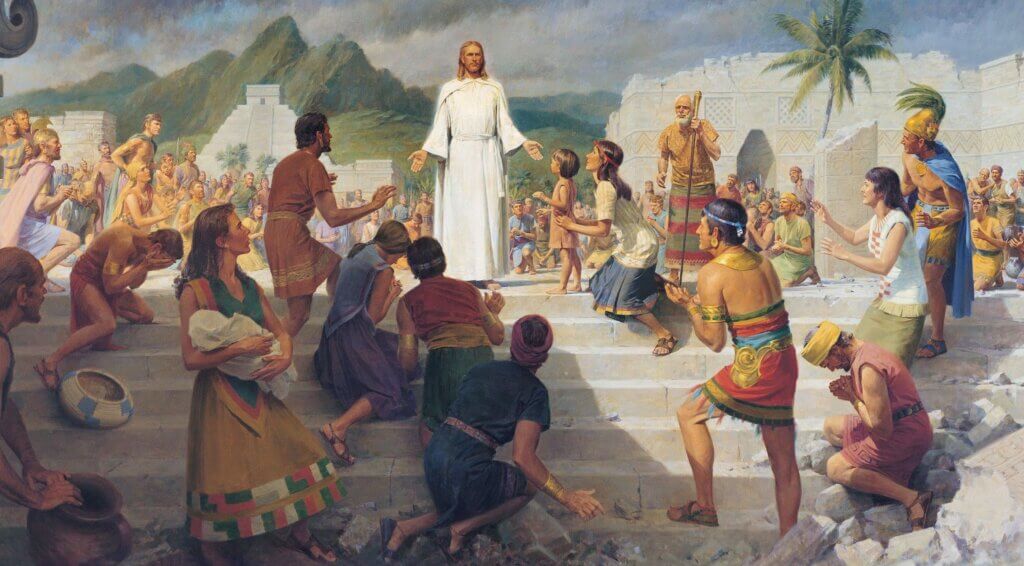Jesus refers to his servant again when giving Lehi’s descendants “a sign, that ye may know the time when these things shall be about to take place—that I shall gather in, from their long dispersion, my people, O house of Israel, and shall establish again among them my Zion” (3 Nephi 21:1; cf. vv 8–11). Jesus’ saying that he will “establish again among them my Zion” implies that he was then establishing his Zion among Lehi’s descendants. That idea is apparent from the glorious age of peace that followed, when Lehi’s descendants had “all things common among them” (4 Nephi 1:3, 22–25; cf. Moses 7:18). In abridging that account, however, Mormon makes scant mention of it, covering some hundred and seventy years in just two pages (4 Nephi 1:1–23). An evident reason is that such earlier attempts to establish Zion among Lehi’s descendants or the house of Israel didn’t adequately serve as a type or precedent of how their endtime establishment of Zion will occur, thus precluding Mormon’s giving a complete depiction of it.
Although the Gentiles “publish peace” and “seek to bring forth my Zion” at the time the Lamb of God restores his gospel to them, as noted previously (1 Nephi 13:34–37), Jesus’ promise to “establish again among them my Zion” refers to the “house of Israel,” not to the Mormon Gentiles (3 Nephi 21:1; emphasis added). To that end, he appoints his servant (1 Nephi 21:1–13; cf. Isaiah 49:1–13), of whom Enoch serves as a type (Doctrine & Covenants 38:4; Moses 7:18–21). Zion is established when God bares his holy arm in the eyes of all the nations (3 Nephi 20:35–37; cf. Isaiah 52:10), when he raises his hand and ensign—his servant—to the nations, and Israel’s exiles return in a new exodus from the four parts of the earth (Isaiah 11:10–12, 15–16; 12:1–6; 49:22): “Let the ransomed of Jehovah return! Let them come singing to Zion, their heads crowned with everlasting joy; let them obtain joy and gladness, and sorrow and sighing flee away” (Isaiah 51:11; cf. 43:2–8; 51:9–10; 52:1–3, 11–12; 55:3–5, 12; 3 Nephi 20:29–45).
The “sign” Jesus gives Lehi’s descendants appears at the time “when these things which I declare unto you, and which I shall declare unto you hereafter of myself, and by the power of the Holy Ghost” are “made known unto the Gentiles” and “come forth of the Father from them unto you” (3 Nephi 21:2–3); or, in other words, “when these works and the works which shall be wrought among you hereafter shall come forth from the Gentiles unto your seed” (3 Nephi 21:5) and “thy seed shall begin to know these things—it shall be a sign unto them, that they may know that the work of the Father hath already commenced unto the fulfilling of the covenant which he hath made unto the people who are of the house of Israel” (3 Nephi 21:7). Candidates for the Gentiles who minister to the house of Israel are those who “know of the true points of my doctrine” and who do “not harden their hearts” (3 Nephi 21:6), implying that other Gentiles at that time do harden their hearts and don’t know the true points of his doctrine.
As we saw previously, the Gentiles as a whole “harden their hearts” at the Lamb’s great and marvelous work (1 Nephi 14:6–7) sometime after they have received the fulness of the gospel (3 Nephi 20:28), causing all who end up fighting against Zion to be “cut off” (1 Nephi 22:18–19). Then are Isaiah’s words fulfilled: “And when that day shall come, it shall come to pass that kings shall shut their mouths; for that which had not been told them shall they see; and that which they had not heard shall they consider. For in that day, for my sake shall the Father work a work, which shall be a great and a marvelous work among them; and there shall be among them those who will not believe it, although a man shall declare it unto them. But behold, the life of my servant shall be in my hand; therefore they shall not hurt him, although he shall be marred because of them. Yet I will heal him, for I will show unto them that my wisdom is greater than the cunning of the devil” (3 Nephi 21:8–10; cf. Isaiah 29:14; 52:13–15).
(Excerpt from Endtime Prophecy, pp 436–439)












